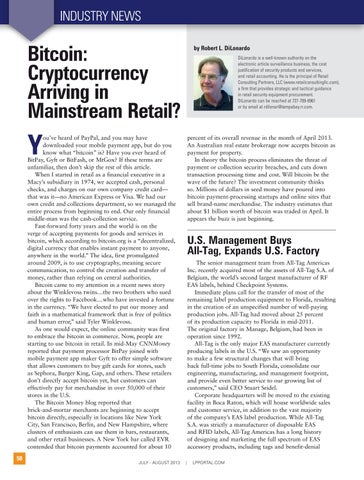industry news
Bitcoin: Cryptocurrency Arriving in Mainstream Retail?
Y
ou’ve heard of PayPal, and you may have downloaded your mobile payment app, but do you know what “bitcoin” is? Have you ever heard of BitPay, Gyft or BitFash, or MtGox? If these terms are unfamiliar, then don’t skip the rest of this article. When I started in retail as a financial executive in a Macy’s subsidiary in 1974, we accepted cash, personal checks, and charges on our own company credit card— that was it—no American Express or Visa. We had our own credit and collections department, so we managed the entire process from beginning to end. Our only financial middle-man was the cash-collection service. Fast-forward forty years and the world is on the verge of accepting payments for goods and services in bitcoin, which according to bitcoin.org is a “decentralized, digital currency that enables instant payment to anyone, anywhere in the world.” The idea, first promulgated around 2009, is to use cryptography, meaning secure communication, to control the creation and transfer of money, rather than relying on central authorities. Bitcoin came to my attention in a recent news story about the Winklevoss twins…the two brothers who sued over the rights to Facebook…who have invested a fortune in the currency. “We have elected to put our money and faith in a mathematical framework that is free of politics and human error,” said Tyler Winklevoss. As one would expect, the online community was first to embrace the bitcoin in commerce. Now, people are starting to use bitcoin in retail. In mid-May CNNMoney reported that payment processor BitPay joined with mobile payment app maker Gyft to offer simple software that allows customers to buy gift cards for stores, such as Sephora, Burger King, Gap, and others. These retailers don’t directly accept bitcoin yet, but customers can effectively pay for merchandise in over 50,000 of their stores in the U.S. The Bitcoin Money blog reported that brick-and-mortar merchants are beginning to accept bitcoin directly, especially in locations like New York City, San Francisco, Berlin, and New Hampshire, where clusters of enthusiasts can use them in bars, restaurants, and other retail businesses. A New York bar called EVR contended that bitcoin payments accounted for about 10
58
July - august 2013
by Robert L. DiLonardo DiLonardo is a well-known authority on the electronic article surveillance business, the cost justification of security products and services, and retail accounting. He is the principal of Retail Consulting Partners, LLC (www.retailconsultingllc.com), a firm that provides strategic and tactical guidance in retail security equipment procurement. DiLonardo can be reached at 727-709-6961 or by email at rdilonar@tampabay.rr.com.
percent of its overall revenue in the month of April 2013. An Australian real estate brokerage now accepts bitcoin as payment for property. In theory the bitcoin process eliminates the threat of payment or collection security breaches, and cuts down transaction processing time and cost. Will bitcoin be the wave of the future? The investment community thinks so. Millions of dollars in seed money have poured into bitcoin payment-processing startups and online sites that sell brand-name merchandise. The industry estimates that about $1 billion worth of bitcoin was traded in April. It appears the buzz is just beginning.
U.S. Management Buys All-Tag, Expands U.S. Factory The senior management team from All-Tag Americas Inc. recently acquired most of the assets of All-Tag S.A. of Belgium, the world’s second largest manufacturer of RF EAS labels, behind Checkpoint Systems. Immediate plans call for the transfer of most of the remaining label production equipment to Florida, resulting in the creation of an unspecified number of well-paying production jobs. All-Tag had moved about 25 percent of its production capacity to Florida in mid-2011. The original factory in Manage, Belgium, had been in operation since 1992. All-Tag is the only major EAS manufacturer currently producing labels in the U.S. “We saw an opportunity to make a few structural changes that will bring back full-time jobs to South Florida, consolidate our engineering, manufacturing, and management footprint, and provide even better service to our growing list of customers,” said CEO Stuart Seidel. Corporate headquarters will be moved to the existing facility in Boca Raton, which will house worldwide sales and customer service, in addition to the vast majority of the company’s EAS label production. While All-Tag S.A. was strictly a manufacturer of disposable EAS and RFID labels, All-Tag Americas has a long history of designing and marketing the full spectrum of EAS accessory products, including tags and benefit-denial |
LPportal.com








